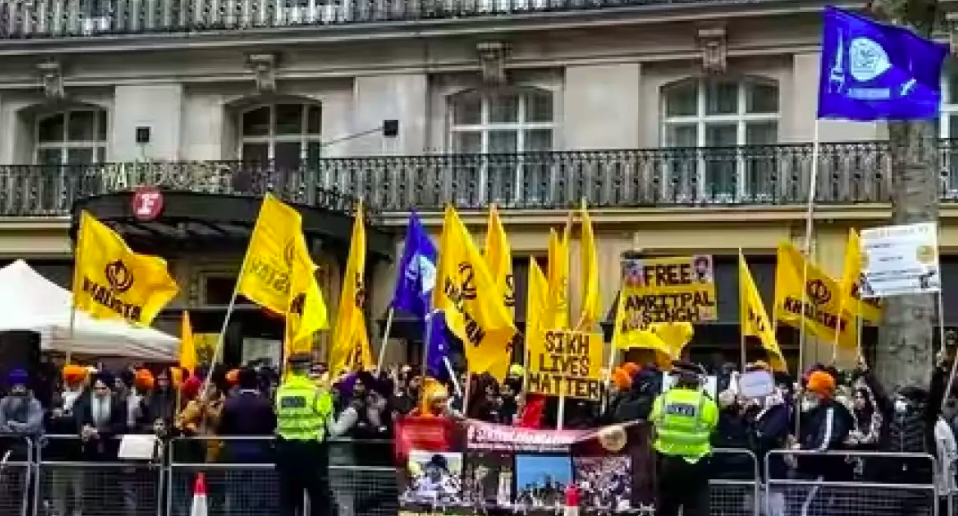The United Kingdom is taking necessary measures to ensure the safety and security of the Indian High Commission in London and its staff members, British Security Minister Tom Tugendhat said, around five months after the mission was attacked by pro-Khalistani forces that put the bilateral ties under some strain.
In an exclusive interview to PTI, the senior minister said the British government is addressing India’s concerns over activities of pro-Khalistani elements and that any attempt to radicalise people in the UK will be dealt with by the law-enforcing authorities.
“Let me be very clear about this. This is not an Indian problem in the UK. Whenever there is radicalisation in the UK of UK citizens, this is a British problem. And so any attempt to radicalise any UK citizen in any direction will be dealt with by the British government,” he said.
“That is why we have the Prevent Programme and we are using it to face those challenges of radicalisation across different communities,” he said.
In March, India reacted angrily after pro-Khalistan elements attacked the Indian High Commission in London and pulled down the national flag from a pole at the front of the building.
Tugendhat was in India on a three-day visit from August 10-12 primarily to attend the G-20 meeting G20 anti-corruption ministerial meeting in Kolkata. In Delhi, he held talks with External Affairs Minister S Jaishankar and National Security Advisor Ajit Doval.
“We work very closely in making sure that we’re supporting each other. In recent days and weeks, I have been very closely involved working with friends of ours and particularly with people in the Indian High Commission to make sure that they’re safe in London and that anyone who threatens them is dealt with by the law,” he said.
On Friday, Tugendhat announced new funding of 95,000 pound (around Rs 1 crore) to enhance Britain’s capability to tackle “pro-Khalistan extremism”.
Highlighting the scope of overall security cooperation between India and the UK, the British Security minister said the gap between “where we are and where we could be” is significantly big.
“I have a great privilege of meeting other governments in other countries to seek to improve our relations. And in many of them, there are small things we can do to improve the relationship,” he said.
“But the reality is the relationship (India-UK) is already very good or is unlikely to change much. One of the things that I see in India is the gap between where we are and where we could be is the greatest. And I think there’s a huge amount more we can do,” he said.
The British security minister also noted that India and the UK are expanding cooperation in dealing with the challenge of terrorism, extremism, radicalisation and cyber crime.
“We’ve made some very good progress in the last few years, and this is based on the fact that both of our governments are dealing with not just similar problems, but we’re dealing with them in similar ways,” he said.
“Our adherence to the rule of law and our protection of individual rights means that we’re looking at these challenges as ways in which we can defend ourselves against these threats,” he said.
Talking about strong-people-to-people connections between the two countries, Tugendhat also noted that some people are exploiting this link for nefarious activities wherever they can.
Delving into cooperation between the two countries in the Indo-Pacific, he said broad security ties have been an important aspect of it.
“Prime Minister (Rishi) Sunak asked me to come to India to talk to your government because much of the focus has been on the Pacific end of Indo-Pacific, as you’re aware. And making sure it goes more rebalanced is incredibly important,” he said.
“Now, look, we have very good army-to-army links. We have very good navy-to-navy links, and those military connections are really important. But security goes beyond that,” Tugendhat said.
“It goes into the technology of our economy. It goes into the security of our people. And that’s where I’ve been working with people in your government to make sure that we’re having that structured dialogue and creating those ongoing relationships that make sure that we’re keeping our people safe and ensuring their continued prosperity,” he added.
Asked about the resolve of the two countries in the Roadmap 2030 to take decisive and concrete action against globally proscribed terrorist entities, Tugendhat did not give a direct reply.
“I’m not going to discuss who we may or may not proscribe..But there are a lot of areas that we’re already cooperating on, where we see threats to our own citizens and indeed to those of our friends and allies,” he said.
The India-UK relationship was elevated to a Comprehensive Strategic Partnership during the India-UK virtual summit held between Prime Minister Narendra Modi and his then British counterpart Boris Johnson in May 2021.
At the summit, the two sides adopted a 10-year roadmap to expand ties in the key areas of trade and economy, defence and security, climate change and people-to-people connections among others.


